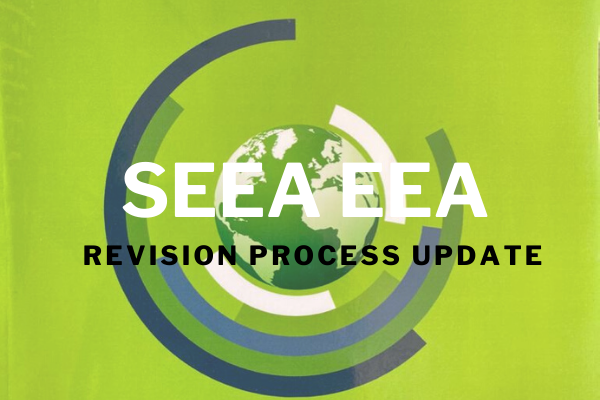SEEA EEA Revision Process Update Q2-2020

SEEA Experimental Ecosystem Accounting (SEEA EEA) Revision, Q2 2020 Update
Since the last update on the SEEA EEA Revision process in April 2020 there has been significant progress with drafting of the chapters of the revised SEEA EEA.
First drafts of all core chapters of the revised SEEA EEA have now been finalized and publicly distributed. The first global consultation on individual chapters was launched on 24 March with the Chapters 3-5 on spatial units, ecosystem extent and ecosystem condition, Chapter 8-11 on valuation and accounting treatments were released for global consultation on 29 May and the Chapters 6 & 7 on accounting for ecosystem services on 20 July. Over 80 responses were received to the global consultation on the first and second set of chapters. The consultation of the third set of chapters is still ongoing until 20 August, and anyone is welcome to submit their comments using the form to seea@un.org. Please find the draft chapters, comments forms and the responses received here. The remaining chapters of the revised SEEA EEA will be drafted over the coming months and considered by the SEEA EEA Technical Committee and Editorial Board. A second global consultation on the whole document will be launched in October 2020.
The Virtual Expert Forum on SEEA Experimental Ecosystem Accounting 2020 was designed to support the revision process with the objective of raise awareness of its status and discuss some of the issues that emerged in the global consultation. Session 1 on ecosystem extent and condition and Session 2 on valuation and accounting treatments took place on 23-24 June and 14-15 July, respectively. Session 3 on ecosystem services is planned for 24-25 August. The sessions gathered over 150 participants from national statistical offices, ministries of environment, international and supranational organizations, NGOs including a strong contribution from academia. During the Virtual Forum sessions, participants were informed of the advances with the SEEA EEA revision, country experiences with testing of spatial units and ecosystem condition framework, practical applications of valuation techniques in countries, as well as discussed outstanding technical issues and provided input into the final drafts of the revised SEEA EEA. Documents and presentations related to the Virtual Forum are available online.
In parallel with the development of methodologies, the testing of the reference classification, the IUCN Global Ecosystem Typology (IUCN GET), and the ecosystem condition framework was undertaken in more than 10 countries. The conclusions of the testing, presented at the Forum, showed that the IUCN GET classification, albeit still under development, may provide a good base for a global reference classification for the SEEA EEA. The results of the testing of the ecosystem condition 3-stage framework, outlined in Chapter 5 and which envisages a stepwise compilation of ecosystem condition depending on countries data, were also very positive. All participating countries supported the framework as developed.
The Subgroup on Accounting for Biodiversity in the SEEA EEA , tasked to ensure that biodiversity is reflected throughout the chapters of the SEEA EEA, focused its efforts on Chapters 3-5 on spatial units, ecosystem extent and condition. A small drafting team, consisting of four members of the Subgroup, drafted a discussion note on spatial aggregation of condition indicators from individual ecosystem assets level to the level of ecosystem types. This note will serve as input into the revised Chapter 5 and the accounting for biodiversity section of Chapter 13.
Engagement with the London Group on Environmental Accounting continued. Webinars were held with London Group members to discuss the draft chapters after their release for global consultation. The webinars provided a forum for discussing any technical concerns and issues of the London Group members.
For all up to date information, materials and documents please regularly check the SEEA EEA revision dedicated website at: https://seea.un.org/content/seea-experimental-ecosystem-accounting-revision
